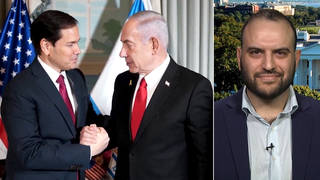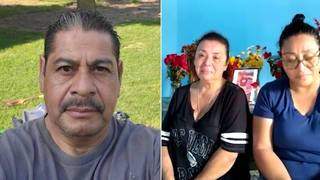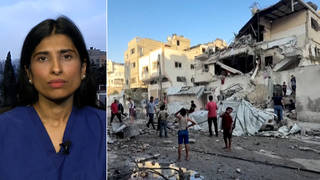
Topics
We’ve been hearing authors and actors and fans of professor Howard Zinn, celebrating Zinn’s tremendous achievement: He has sold 1 million copies of his revolutionary book, “A People’s History of the United States.” We go now to a speech Howard Zinn gave at the New School University earlier this month. He talks about bombs, terrorism, the antiwar movement and the Bush administration’s impending war on Iraq.
Transcript
AMY GOODMAN: We go now to a speech of Howard Zinn given at New School University earlier this month. He talks about bombs, terrorism, the antiwar movement and the Bush administration’s impending war with Iraq. This is Howard Zinn, professor emeritus of political science at Boston University and former professor at Spelman College in Atlanta.
HOWARD ZINN: I read the statement recently by a Pentagon official talking about the impending war on Iraq: There will not be a safe place in Baghdad. Well, that’s interesting. Five million people live in Baghdad. There will not be a safe place in Baghdad. I thought you were only going to bomb military targets. Then there should be safe places where there are not military targets. No, there will not be a safe place in Baghdad.
And then he said that the goal is, quote, “the psychological destruction of the enemy’s will to fight.” That’s the kind of language that was used in World War II to justify the bombing of Dresden and Hamburg and Frankfurt and other civilian populations. That’s the language that was used in Vietnam to justify the bombing of villages in Vietnam. Our objective is to destroy the morale of these people. And they’ve used the word — you’ve probably seen this: “shock and awe.” “Shock and awe” are the intentions. Sounds like terrorism to me, really. And, in fact, bombing is terrorism. War is terrorism.
Talk about enlarging our vision. What happened on September 11th here was terrorism. This was an awful, terrible, really awful terrorist act. But to draw a line around the Twin Towers and the Pentagon and say, “This is where — this is where terrorism has existed in the world,” is to miss out on a lot. We’ve had a lot of terrorism in the world, all over the world. The New York Times after September 11th sent reporters to inquire of people in various Third World countries what their reaction was to the bombing of the Twin Towers, and the reaction everywhere, including in the Middle East, the reaction was unanimous: This is a terrible thing. I mean, despite all of the thing — “Oh, they’re celebrating.” No, the reaction against almost all people was this was a terrible thing. But then they said something else. They said, “But you must understand that you are not the only victims, that we in the rest of the world, we have been victims again and again of terrorism. We have seen large numbers of people die in India and Africa and other places.” So we have to enlarge our notion of what terrorism is.
By the way, on military targets, in the middle of the Gulf War, the first Gulf War, in 1991, in February 1991, the United States Air Force dropped a bomb on an air raid shelter in Baghdad. An air raid shelter. Four hundred to 500 men, women and children will huddled in this air raid shelter to escape bombing. They were incinerated. You would expect then the United States to say, “This was a mistake,” as they said so many other times. “We didn’t mean this,” or “We were given false intelligence data.” No, the United States said, “No, we we wanted to bomb that air raid shelter because there was some military equipment there, electronic equipment.” Now, you might ask, even if there was equipment there, I mean, that justifies the massacre of 400 or 500 people? You mean, if we allow that electronic equipment to survive, we would lose the war? I mean, as it turned out, reporters going into the wreckage of the air raid shelter immediately after found no evidence of any kind of electronic equipment of anything military. So you have to beware of all the claims that are going to be made once the bombing starts in Iraq about military targets and accident and all of that.
You know, the United States itself has a history of terrorism. It’s not as if, you know, we are pure, and terrorism is only directly against us. In 1985, under the Reagan administration, and it was with Casey, head of the CIA, the United States planned a bombing that would take place at a mosque in Beirut. About 80 people were killed. They were going after — the idea was — you know, of course, this was all a covert operation. The idea was to get, kill, get rid of a certain Shiite leader that the United States had decided should be gotten rid of. Well, actually, it didn’t get that guy, but they killed 80 people and wounded several hundred others. This was something that’s hardly — very few people know about that. But Casey, Casey told about this later. And you might get the idea that I’m trying to take apart those claims of the United States government when it goes to war. I would never do that.
The United States has never been serious about the war on terrorism. You can’t be. Just the idea of a war on terrorism, of Bush getting up after September 11th and saying, “We are declaring a war on terrorism,” it makes no sense. You can’t make war on terrorism. It’s not that kind of a thing. It’s not a specific place. It’s not — in fact, you know, well, you know that the government has said again and again, “Well, terrorists, they have cells in 20 countries, 30 countries, 40 countries.” They change the number all the time. The reason they change the number is they don’t know. They don’t know. There’s a lot they don’t know. So they make it up. But yes, it makes sense that terrorism is not the kind of thing that comes from any one source.
So, what does the United States do? It goes ahead and bombs Afghanistan, because there may be — probably is — a terrorist cell in Afghanistan, one of 30. But let’s pick Afghanistan — Afghanistan, a country that has gone through two wars, that has had a million refugees pour out of the country, a country that is devastated. And so you bomb Afghanistan so that you can make war on terrorism.
And at the end of a year of bombing, where are you? OK, you’ve gotten rid of the Taliban. Actually, that wasn’t your aim, but it was a nice little surprise. OK. But at the end of a year of bombing, what have we accomplished against terrorism? In fact, the CIA reports, a year after the bombing, the danger of terrorism is as great today as it was before September 11th. Well, and you know that yourself; you don’t even need the CIA to tell you that. Do you feel safer now as a result of a year of bombing Afghanistan, as a result of a year in which we kill several thousand people in Afghanistan, in which very large numbers of people are wounded by cluster bombs, and kids end up in hospitals blinded and without arms because of our bombing in Afghanistan?
And now we — I have a very vivid memory of this one 10-year-old kid. And these stories only make their way into the papers very intermittently, so that nobody could really put them together and come up with a large and frightening pattern. But I have a very vivid memory of this one story about this 10-year-old kid in a hospital on the border between Afghanistan and Pakistan, a kid named Noor Mohamed. He was 10 years old, and his eyes were gone, and two of his arms were gone, as a result of American bombing. And the father was standing there and saying to a reporter, “Look at him. Does he look like Osama bin Laden?”
This is what happens when you bomb. In all of this discussion that goes on about, oh, inspections and weapons of mass destruction and the violation of U.N. resolutions, in all of this, there’s very little discussion of who is going to die in this war, who’s going to be wounded in this war, how many people are going to be blinded, how many children are going to lose their limbs. There is no human vivid picture of what the result of this war will be. And it’s important for us to keep that in mind and remind other people about that.
And a little history there would come in handy — that is, a history of reactions to terrorism. Doesn’t take much, looking at the history, to see that when nations react to terrorist acts with force, it doesn’t stop the terrorism. You know, IRA terrorism went on for 20, 30 years, and the British, again and again and again, used force against it. It didn’t stop. It didn’t stop until there was some attempt to deal with the grievances of the IRA.
Now, of course, the most obvious example — and here, you know, look outside of Iraq. Look at other places. Look at Israel, and look at the suicide bombers, and look at the terrorism of the suicide bombers, yes. And so the Israelis meet the terrorism of the suicide bombers with a terrorism of its own. And what is the result? More suicide bombing. The government cannot be believed when it says that it is really interested in doing something about terrorism, because it really takes very, very little historical knowledge to understand that you can’t bomb terrorism out of existence. You have to do something about the underlying grievances. Terrorism in Israel, the suicide bombers won’t stop, unless, until Israel gets out of the Occupied Territories. It’s very simple, very clear.
So there must be something else going on. It can’t really be terrorism, just as during the Cold War and during all those years when the United States was marauding around the world, saying, “We’re doing this because of communism. We’re doing this to stop communism. You know, we’re sending military aid to the dictatorships in Central America to stop communism, going into Vietnam to stop communism, supporting the Indonesian government in its massacre of people on East Timor — communism, communism.” You see. You begin to look back on that and wonder: Was it really communism?
Now, of course, there was something real about communism. There was a Soviet Union. The Soviet Union did take over Eastern Europe. But there’s a difference between recognizing the reality and expanding that reality until it becomes so monstrous and evil that it creates a hysteria, which distorts everything you do. That’s what happened in the Cold War, when communism became not just the Soviet Union taking over Eastern Europe or tyrannizing its own people, but where communists were seen everywhere. And every revolution took place in every country, with any upsurge of guerrilla warfare, any uprising against the rich who control the country was seen as somehow connected with a world communist conspiracy.
So, there must have been something other than communism. Well, the proof of that — a little historic test, right? If all the things we were doing in the world and the ballooning of our military budget, the $300 billion a year, if all of this was due because of communism, well, let’s test this. What were we doing before 1917, before there was a Bolshevik Revolution, before there was a Soviet Union? Oh, were we then nice? Did we then not send troops anywhere? No, the history of American foreign policy before 1917 is a history of endless military interventions into Central America and to the Caribbean.
And then, what happens after 1989, '90, when the Soviet Union is gone? Remember they talked for about two days about a peace dividend? Oh wow! The Soviet Union is gone. We don't need $300 billion in the military budget anymore. We can use it for health, for education, to help people. No, now we have a military budget of close to $400 billion.
No, it wasn’t communism. It was something else. If you look for the common denominator behind all of the reasons given for war and military intervention, if you look for the common denominator in American foreign policy going back to the Revolutionary War, going back to the endless wars against the Indians in their own territory to drive them out of their territory, and coming forward down to the present day, if you look for the common denominator, it’s not hard to see. It’s expansion. It’s the expansion of national power. It’s the economic expansion. It’s military expansion. It’s political expansion. When you see that, then, suddenly, all of the excuses being given, all the reasons being given for going to war, they all fall apart.
AMY GOODMAN: Howard Zinn, giving an address at New School University in New York. We’ll come back to that in just a minute. If you’d like to get a copy, you can call 1-800-881-2359, 1-800-881-2359. Back in a minute.
[break]
AMY GOODMAN: Sara Thomsen, “Is It for Freedom?” here on Democracy Now!, Breaking the Sound Barrier. I’m Amy Goodman. As _ A People’s History of the United States_, the million copy is sold, we go back to Howard Zinn, its author, the great historian, giving an address at New School University.
HOWARD ZINN: There’s a pattern you see historically, that wars are useful to build up the political capital of the government in power. The New York Times, which I always believe, just had a little editorial last July: “Time is getting short for decisions that have to be made, if the goal is to take action early next year” — that is, now — “before the presidential election cycle intrudes.” That’s interesting. If we have to decide about whether we’re going to take action, depending on the presidential election cycle. Well, when you think about it, it’s not surprising. Presidents care more about their political fortunes than they care about who will die in a war.
I mean, if you listen to the — listen to the tapes of JFK, listen to the tapes of Lyndon Johnson. And what do you find? You find that Kennedy, in 1963, is thinking about whether he should withdraw some of the troops from Vietnam. He has put in a bunch of troops, but he’s deciding on whether he would pull out some troops from Vietnam, but he’s deciding it on the basis of what effect this will have on the election. He thinks maybe he ought to wait until the 1964 election. That’s interesting. I mean, there are people dying in Vietnam, and you’re going to make a decision about whether to withdraw troops on the basis of the ’64 election.
And then you listen to the tapes of Lyndon Johnson, and Lyndon Johnson in 1965 is talking with Richard Russell, his friend, and he’s worried about getting more heavily into the Vietnam War. And Russell is saying to him, in effect, “You know, maybe we better get out.” Russell, a conservative from Georgia, is saying — you know, really. And Johnson is saying, “Well, it’s true, you know, people will die if we continue escalating this war in Vietnam.” But then he says, “Yeah, but if I pull out, they’ll impeach me, won’t they?” That’s interesting. He’s worried about people dying in Vietnam, but he doesn’t want to pull out because then he might be impeached. His presidential future is more important than the deaths of thousands of people. This is a chilling idea that this is what presidents care about, and that the lives of people are expendable, depending on their political ambitions.
And incidentally, before the Gulf War, just before the Gulf War, the first Gulf War, the senior adviser to Bush Sr. — two “senior”s there — a senior adviser to the elder Bush, Sununu — sounds like the name of an automobile but is the name of his adviser — Sununu told a reporter for The Washington Post that Bush’s popularity was going down, that his polls were down, and that Bush needed something to happen in foreign policy to boost his chances in the next election.
Well, do you think it’s possible that the present Bush Jr., in considering war on Iraq, is also considering his political future? Is that conceivable that he would care more about political advantage than he would about the human mayhem that will be caused in a war in Iraq? Well, it’s worth thinking about.
So, I’m suggesting that — I just realized you were told I would speak for 45 minutes. There’s a lot of deception that goes on in events like this, yes. I’m going to have to cut out the most important things. Well, actually, that’s not true. But just I have to — somehow have to justify my violating my oath to the organizers.
But I suspect that one of the reasons that the antiwar movement has grown so fast and why it has reached out to sections of the population that were never involved in antiwar movements before — and you know this when you go to demonstrations. You see people have never been involved in these things before, and they’re coming out there. You see vigils and protest movements and rallies and teach-ins taking place in little towns all over the United States that never had anything like that before. I got an email from Bozeman, Montana, telling me there’s an antiwar demonstration in Bozeman, Montana, and three other towns in Montana. And five cities in Alaska and places all over this country that never had antiwar — I think the reason for the growth of the antiwar movement is — one of the reasons for the growth of the antiwar movement is the fact that the rationale for war given by the administration is so obviously, pitifully empty, weak and hypocritical.
And just takes — you know, it just takes a little bit of thought, a little bit of learning, little bit of information to see through, you know, that hypocrisy, like, “Oh, they’re violating Security Council resolutions.” Well, yes, they are. True. They’re the only country that has violated Security Council resolutions? There have been lots of violations of Security Council resolutions. And by the way, the United States does not have to violate Security Council resolutions. It has veto power in the Security Council. It just can veto everything. It can get rid of anything it doesn’t want to, legally, without violating Security Council…
But you might add one more thing. The United States talks about violating Security Council resolutions, but the United States, if it makes war on Iraq, is violating the most basic principle of the United Nations Charter — not just the Security Council resolution but the U.N. Charter, which makes it clear that it is not legal, it is not legitimate, it is not acceptable to go to war against another country unless you’ve been attacked. You can only engage in war for self-defense. We are not defending ourselves. We have not been attacked. Saddam Hussein is not attacking anybody. He may be — and he is — a tyrant and a brutal in this and — he’s all of the things that people say he is. But he is not at this moment attacking anybody, threatening anybody — unless you think that you ought to attack a country because someday it may threaten you. Well, I mean, that’s a prescription for endless, endless violence.
But right now Iraq is not a clear and present danger to the countries around it. In fact, look at the attitudes of the countries around it. It’s the countries around it that oppose an American war. It’s the country which is farthest away from Iraq, and which has the greatest armament in the world, that declares itself worried about Iraq. There’s something ludicrous about that.
I remember seeing an editorial in The Boston Globe not long ago, which The Boston Globe says — and The Boston Globe is, you know, supposedly a liberal paper and hesitant about going to war and — but said, “Well, you know, President Bush has shown courage in challenging Saddam Hussein.” Really? Here is the greatest military power in history, facing a fifth-rate military power, that is, you know, maybe hiding some weapons of mass destruction. The United States has 20,000 nuclear weapons, and biological warfare and chemical weapons — hasn’t been an inspection recently. We don’t know what the United States has. There’s a good guess, but the United States refuses to ratify and to strengthen the the Convention Against Biological Weapons, that other companies — other countries want to do. The United States doesn’t want to do that. No, no, the clear and present danger to the peace of the world right now is the Bush administration and the United States government. That’s the clear and present danger. You know, so…
AMY GOODMAN: Howard Zinn, historian, author of People’s History of the United States, which just sold the millionth copy. Howard Zinn, speaking at New School University. If you’d like to get a copy of today’s program, you can call 1-800-881-2359. 1-800-881-2359. Democracy Now! is produced by Kris Abrams, Mike Burke, Angie Karran, Ana Nogueira, Alex Wolfe. Mike Di Filippo is our engineer. Our website is democracynow.org. Our email address is mail@democracynow.org. I’m Amy Goodman. Thanks for listening to another edition of Pacifica’s Democracy Now!











Media Options